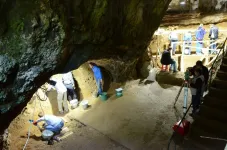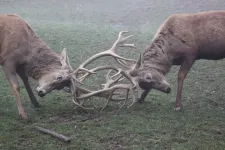(Press-News.org) In a new study, North Carolina State University researchers found that an outdoor science program was linked to higher average science grades and an increase in a measure of science knowledge for a group of fifth grade girls in North Carolina.
The findings, published in the International Journal of Science Education, indicates outdoor education could be a promising tool to help close gender gaps in science.
"The outdoors is a space where teachers can find tangible ways to make science come alive," said the study's lead author Kathryn Stevenson, assistant professor of parks, recreation and tourism management at NC State. "The natural environment is also a place that everybody has in common. In a way, it's also a great context for employing reform-based teaching practices like hands-on, inquiry-based learning or group work. These practices can be good for all students, but they may be particularly good for reaching students who aren't as well-served in classroom settings."
The researchers studied the impact of an outdoor science education program called Muddy Sneakers on fifth graders' science grades and knowledge of, and attitudes about, science. Fifth graders from western North Carolina attended between six and 10 days of Muddy Sneakers during the 2016-2017 school year. They had science lessons in nearby natural areas, including state parks and school grounds. Outdoor lessons followed the standard course of study for science through hands-on activities, hikes, science journaling, nature exploration and reflections.
Researchers compared the performance of 237 students who learned about science in the classroom to 403 students who participated in the outdoor program. They compared students' grades - which were provided by their teachers - and also used surveys to evaluate students' knowledge about how science works and their feelings about science.
When researchers evaluated students' science grades by gender, they saw that girls who participated in the outdoor science program maintained their science grades on average, while girls' average grades in the traditional science classes dropped. They also saw that participation in the outdoor program helped girls learn more about how science works on average, but traditional classrooms did not.
Boys in the outdoor and traditional class settings had fairly stable science grades on average and saw similar gains in knowledge of how science works.
The researchers reported their findings for girls was consistent with research that shows that girls start to disengage with science around age 10. The outdoor program could be providing a learning context that is different than those that enforce traditional gendered narratives about science and science learning, they argued.
"Outdoor education seems to be one of those contexts that helps everyone learn, but it may be really, really helpful for some students in particular," Stevenson said.
When they evaluated ratings of self-efficacy, which is students' confidence in their own science ability and interest in the field, they found boys' and girls' ratings actually declined on average.
The researchers argued that the measure of science efficacy may be missing an important component that could be more important for encouraging long-term interest in science: an attitude of persistence despite failure. It could be that the results captured that the students were less likely to see science ability as an innate talent rather than the product of hard work.
They also say the outdoor program could have been a new challenge for students. That might explain why students were less confident in their science ability after the program, but still showed gains in science grades and knowing how science works.
"A good combination for students to sustain success is - you need them to learn, but you need them to feel comfortable with not knowing it all," Stevenson said. "While self-efficacy dropped, achievement was stable."
INFORMATION:
Note to authors: The abstract follows.
"How outdoor science education can help girls stay engaged with science"
Authors: Kathryn T. Stevenson, Rachel E. Szczytko, Sarah J. Carrier and M. Nils Peterson.
DOI: 10.1080/09500693.2021.1900948
Published online March 22 in International Journal of Science Education.
Abstract: Although gender gaps associated with K-12 science achievement have narrowed significantly, gaps in science engagement and efficacy in childhood likely explain why women remain underrepresented in science careers. Early intervention programs may address root causes of gender gaps in science careers. Outdoor science education (OSE) is one understudied but promising strategy, that provides ample opportunity for reform-based instructional practices that may benefit girls, including girls of colour. Using a pre-post, treatment-control quasi-experimental design, we evaluated how an OSE program differentially impacted the science grades, science knowledge, and science self-efficacy of fifth grade girls versus boys (n = 640). We found the OSE treatment increased knowledge and maintained science grades for girls while grades fell for girls in the control group. We also found that science self-efficacy decreased for both boys and girls in the treatment group. We did not detect direct or interaction effects of race on science outcomes. Research suggests OSE may help students associate science learning with challenge, which may help explain the decrease in self-efficacy coupled with the increase in achievement for girls. We suggest future research continue to investigate how OSE can benefit all students, including those who may become disengaged with learning in traditional classroom settings.
Conspiracy theories appear to be increasing in popularity as the Covid-19 pandemic continues. But to what extent do people really agree with them, and what is the association with cognitive biases? A research team from the University of Basel studied these questions in German-speaking Switzerland and Germany.
Periods of crisis are often conducive to the emergence and spread of conspiracy theories, and the Covid-19 pandemic is a case in point. A research team led by Sarah Kuhn and Dr. Thea Zander-Schellenberg of the University of Basel has investigated the endorsement rates of coronavirus-related conspiracy theories in German-speaking Switzerland and Germany, ...
Muons, particles akin to electrons, have kepts physicists' heads spinning for more than a decade, because an experimental measurement of their magnetic properties (1) disagrees with theory. Could this be caused by unknown particles or forces?
A new theoretical calculation of this parameter, involving CNRS physicists and published in the journal Nature, has reduced the discrepancy with the experimental measurement. The debate nevertheless continues.
--
For over 10 years, measurement of the magnetic properties of the muon (an ephemeral cousin of the electron) has exhibited disagreement with theoretical predictions. This ...
A team of scientists, led by the University of Bristol, with archaeologists from Oxford Archaeology, have found the first evidence of a religious diet locked inside pottery fragments excavated from the early medieval Jewish community of Oxford.
Keeping kosher is one of the oldest known diets across the world and, for an observant Jew, maintaining these dietary laws (known as Kashruth) is a fundamental part of everyday life. It is a key part of what identifies them as Jews, both amongst their own communities and to the outside world.
Oxford's Jewish quarter was established around St. Aldates in the twelfth and thirteenth centuries, following William the Conqueror's invitation ...
Women are significantly underrepresented in the editorial boards of marketing academic journals, and awards and recognition favour men, new research from the University of Bath School of Management has found.
In their study 'It's hard to be what you can't see - gender representation in marketing's academic journals', Professor Andrea Prothero of Business and Society at University College Dublin and co-researcher Professor Pierre McDonagh examined gender representation in 20 marketing academic journals through three areas - the gender composition of editorial boards, special issue celebrations ...
Worldwide 39 percent of the adults were overweight in 2016, according to statistics of the World Health Organization. In the US the prevalence of obesity was 42.4 percent in 2017/2018, according to a survey of the National Center for Health Statistics (NCHS).
Concurrently millions of people want to lose weight. Physical exercise is an important option to achieve this. After all, more calories are consumed through sport than when sitting, standing or lying down.
But what influence does sport have on (direct) eating habits? Scientists at the Technical University of Munich (TUM) and the University of Nebraska (USA) have now investigated this ...
An international research team has sequenced the genomes of the oldest securely dated modern humans in Europe who lived around 45,000 years ago in Bacho Kiro Cave, Bulgaria. By comparing their genomes to the genomes of people who lived later in Europe and in Asia the researchers from the Max Planck Institute for Evolutionary Anthropology in Leipzig, Germany, show that this early human group in Europe contributed genes to later people, particularly present-day East Asians. The researchers also identified large stretches of Neandertal DNA in the genomes of the Bacho Kiro Cave people, showing that ...
Working safely is not only about processes, but context - understanding the work environment and circumstances, and being able to predict what other people will do next. A new system empowers robots with this level of context awareness, so they can work side-by-side with humans on assembly lines more efficiently and without unnecessary interruptions.
Instead of being able to only judge distance between itself and its human co-workers, the human-robot collaboration system can identify each worker it works with, as well as the person's skeleton model, which is an abstract of body volume, says Hongyi Liu, a researcher at KTH Royal Institute of Technology. Using this information, the context-aware robot system can recognize ...
3D-mammography reduces the number of breast cancer cases diagnosed in the period between routine screenings, when compared with traditional mammography, according to a large study from Lund University in Sweden. The results are published in the journal Radiology.
"Our results indicate that 3D-mammography, or digital breast tomosynthesis, possibly detects cancers that would otherwise have been diagnosed later at a more advanced stage", says Kristin Johnson, doctoral student at Lund University and radiology resident at Skåne University Hospital.
A large prospective screening study conducted at Skåne ...
WESTMINSTER, Colorado - April 07, 2021 - As the number of weed populations resistant to multiple herbicides continues to soar, it is clear that better tools are needed to help growers rapidly diagnose resistance issues. With more timely access to information, they can take earlier, proactive steps to keep resistant weeds from spreading.
A recent article in the journal END ...
An international team of researchers has studied individual differences in the behaviour of red deer. They found that several observed behaviours form a personality component, which they labelled "Confidence/Aggressiveness".
As is commonly known, individual people behave consistently different from each other and these kinds of consistent differences in behaviour are called personality. Studies on species other than humans, from insects to elephants, have found that personalities are widespread in nature.
The team consists of researchers from the Czech University of Life Sciences Prague, the University of South Bohemia, Czech Republic, the University of Vienna, Austria, and the University of Turku, Finland and is led by Bruno Esattore from the Department of ...



